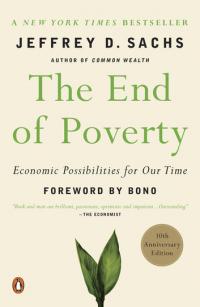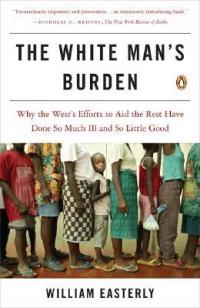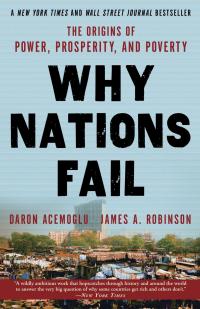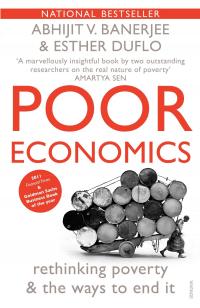Summer Readings
| Book Title | Author |
| The Taste of Many Mountains | Bruce Wydick |
| The End of Poverty: Economic Possibilities for Our Time | Jeffrey Sachs |
| The White Man's Burden: Why the West's Efforts to Aid the Rest Have Done So Much Ill and So Little Good | William Easterly |
| Why Nations Fail: The Origins of Power, Prosperity, and Poverty | Daron Acemoglu and James Robinson |
| Poor Economics: A Radical Rethinking of the Way to Fight Global Poverty | Esther Duflo and Abhijit Banerjee |





Book Summaries:
- The Taste of Many Mountains, Bruce Wydick: "Based on an actual research project on fair trade coffee funded by USAID, The Taste of Many Mountains is a brilliantly-staged novel about the global economy in which University of San Francisco economist Bruce Wydick examines the realities of the coffee trade from the perspective of young researchers struggling to understand the chasm between the world’s rich and poor."
- The End of Poverty: Economic Possibilities for Our Time, Jeffrey Sachs: "[Jeffrey Sachs] explains why, over the past two hundred years, wealth has diverged across the planet and why the poorest nations have so far been unable to improve their lot. He explains how to arrive at an in-depth diagnosis of a country’s economic challenges and the options it faces. He leads readers along the same learning path he himself followed, telling the stories of his own work in Bolivia, Poland, Russia, India, China, and Africa as a way to bring readers with him to a deep understanding of the challenges faced by developing countries in different parts of the world."
- The White Man's Burden: Why the West's Efforts to Aid the Rest Have Done So Much Ill and So Little Good, William Easterly: "Easterly, an NYU economics professor and a former research economist at the World Bank, brazenly contends that the West has failed, and continues to fail, to enact its ill-formed, utopian aid plans because, like the colonialists of old, it assumes it knows what is best for everyone. Existing aid strategies, Easterly argues, provide neither accountability nor feedback. Without accountability for failures, he says, broken economic systems are never fixed. And without feedback from the poor who need the aid, no one in charge really understands exactly what trouble spots need fixing. True victories against poverty, he demonstrates, are most often achieved through indigenous, ground-level planning."
-
Why Nations Fail: The Origins of Power, Prosperity, and Poverty, Daron Acemoglu and James Robinson: "Why Nations Fail is a sweeping attempt to explain the gut-wrenching poverty that leaves 1.29 billion people in the developing world struggling to live on less than $1.25 a day... [It] focuses on the historical currents and critical junctures that mold modern polities: the processes of institutional drift that produce political and economic institutions that can be either inclusive — focused on power-sharing, productivity, education, technological advances and the well-being of the nation as a whole; or extractive — bent on grabbing wealth and resources away from one part of society to benefit another."
- Poor Economics: A Radical Rethinking of the Way to Fight Global Poverty, Esther Duflo and Abhijit Banerjee: "Poor Economics argues that so much of anti-poverty policy has failed over the years because of an inadequate understanding of poverty. The battle against poverty can be won, but it will take patience, careful thinking and a willingness to learn from evidence. Banerjee and Duflo are practical visionaries whose meticulous work offers transformative potential for poor people anywhere, and is a vital guide to policy makers, philanthropists, activists and anyone else who cares about building a world without poverty."